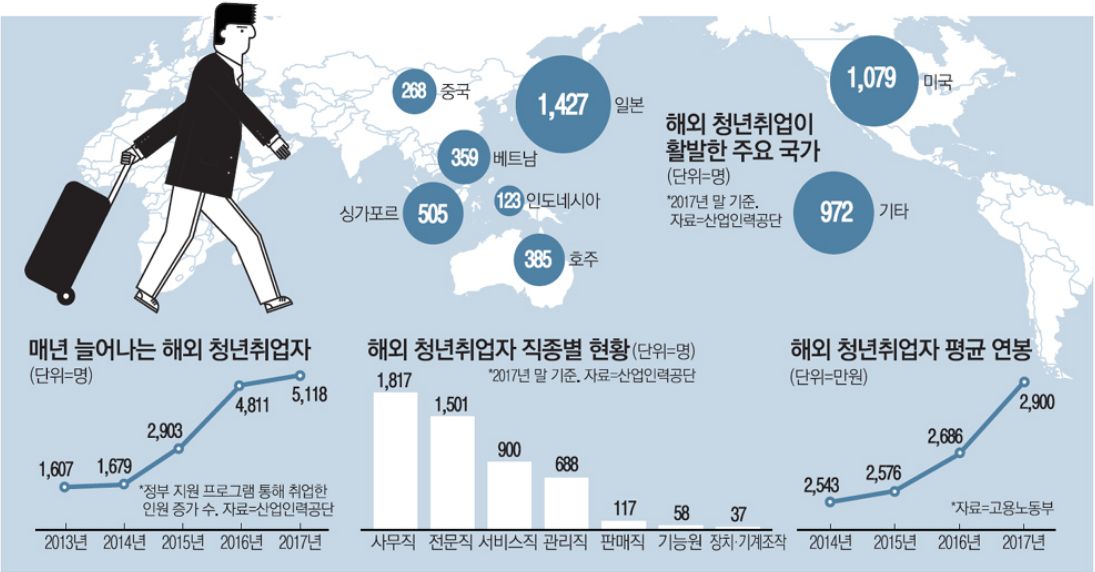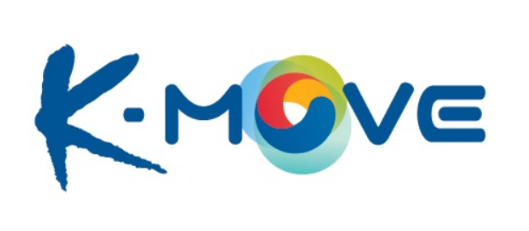Despite increasing efforts by the government to increase the number of employed people domestically, no significant increase has been achieved. Accordingly, university students are now shown to increasingly be interested in working abroad. With the growing exodus of students to pastures afar, let's find out why there are more jobs abroad, countries with more jobs abroad, and what concerns them.
Why are jobs abroad increasing?
The employment portal Incruit analyzed the overseas applications of the Korea Industrial Human Resources Corporation, on October 11, 2018, and in 2017, the total number of employed overseas stood at 5,118 or 22.3% of the total number of job applicants (22,997). As of 2017, Japan had the most working Korean expats with 1,427 people, followed by the United States with 1,097 people, Singapore with 505 people, and Australia with 385. As in Korea, Japan has a public recruitment system, so it has hired all of its majors. When looking at employment in the U.S., the IT and healthcare fields were the main areas for Korean workers (applications development and home health care providers). Singapore has no public recruitment system like Korea, so there are many employment opportunities as a cook, an aircrew, and a five-star hotelier, among others.
 |
The average employment rate of OECD member countries is 41%, compared with 27% in Korea, which is 29th out of 35member countries. This is low compared to other countries. According to the National Statistical Office's 'September Employment Trends' released on October 12, 2018, the number of employed overseas and domestic workers totaled 27.05 million in September, up 45,000 from a year earlier. The increase in the number of employed rose in September due to an increase of 137,000 people in economic activities and an increase in the unemployed of 92,000 excluding the number of employed. The number of employed plummeted to 100,000 in February 2018 and has remained around 100,000 for five consecutive months. Some analysts say that the employment rate is still far from recovering the job market, even though the employment rate has briefly avoided negative factors. According to the employment statistics released by the Ministry of Education and the Korea Educational Development Institute, in December 2017, employment of engineering college graduates sat at 71.6% whereas, employment of College of Liberal Arts graduates was 57.6%, the only area that did not exceed 60%. The employment of the College of Social Sciences recorded a 67% employment rate.
In a survey of 1,583 Korean adult males and females in their 20s and 30s in 2018, 83.4% of respondents said they would like to work abroad if they were given an opportunity. Female preference (84.4%) was slightly higher than male preference (81.1%). 83% (multiple responses) said they wanted to get a job abroad, 'I think it's well equipped with working conditions and welfare systems.' 54.9% said they could develop their language skills while working abroad. In a survey of countries preferred as work destinations for Koreans, Canada ranked first with 44.4%, followed by the United States with 37.7%, Australia with 35% and Japan with 29.9%. Work sector popularity showed that 'media, advertisement, and culture arts’ were the most sought-after fields followed by 33.3% for the services sector and 31.1% for IT, information communication, and Internet professions.
 |
A country with a large number of Korean employees
In Japan, which is the top job market for Korean workers as of 2017, companies have been having difficulty finding talent since 2016. As of April 2017, the employment rate for Japanese college graduates was 97.6%, the highest since the Japanese Ministry of Health, Labor and Welfare surveyed the employment rate of college graduates in 1997. Japan's recruitment scale is 1.74, meaning that each job applicant can enter 1.74 companies. With more domestic moves promoting employment in Japan, it is likely that Japan will open its recruitment door. In terms of the characteristics of Korean students who are employed in Japanese companies, 65% of them are female, and 70% are in a College of Liberal Arts. If the employed can speak Japanese, it is worth trying to get a job in Japan. Because Japanese companies see the potential of the employed rather than the specifications, analysis of the companies and preparation for interviews can be enough to succeed in overseas employment. If you are a liberal arts student and in order to get a job in a Japanese company, you need to have a Japanese proficiency test called JLPT N1, while students in science and engineering need to have an N2 level of Japanese. JPLT N1 is enough to take classes at a local school in Japan, and N2 level speakers are capable of simple conversation. Self-introduction is important when applying to Japanese companies, and if the company's work characteristics and processes of growth are combined with storytelling, personnel managers can stand out. According to Kim Bu-kyung, vice president of Manavi Korea, which links Korean students to Japanese companies, there is a perception in Japan that they are 'good at English' even if they only achieve 700 TOEIC score. A TOEIC score in excess of 800 is enough to apply to large Japanese companies.
In order to gain employment in the United States, a strategy of selecting the most promising jobs for foreign workers must be identified first. Based on the number of 'labor permit applications' required to apply for a U.S. professional job visa, the largest number of foreign workers employed in the U.S., in 2016, was in computer system design and related services. The 2nd was management, scientific and technical consulting, 3rd in university and professional graduate schools, and 4th in architectural engineering and related services. Korean IT developers work long hours on low salaries. A study by the Workers' Rights Search Business Group ‘Workers Future’ on IT Workers in Seoul, in 2015, showed that IT workers worked 48.5 hours a week, accounting for 26.1% of long-term labor over 52 hours. The average salary was 42.89 million won per year, and the average annual salary of U.S. software developers is much higher at about 115 million won. IT development in the U.S. is a good work environment because there is no overtime not a horizontal culture. In addition, the number of IT-related jobs has increased every year to about 65 to 70% of all H-1B visa applications issued to foreign workers in the U.S.
 |
An overseas employment program
Inha University will strengthen its support for expanding opportunities for overseas employment for graduates through its overseas job program - the K-Move project - beginning in November 2016. As part of this project, Inha University received 230 million won in total business expenses through the K-Move program, which was conducted by the Korea Industrial Human Resources Corporation. And K-move businesses uses overseas local networks to find good jobs and helps American and Vietnamese companies fill job vacancies when graduates complete certain training sessions. The U.S. program will select a total of 20 people for a six-month course in the U.S. Employment, International Trade and Distribution Industry, which includes business, English and other foreign languages. The Vietnamese program selected a total of 10 people to receive job and English training over a four month period through ‘The process of training international traders from Vietnam’. Regarding the K-Move program, an official said, "If students complete this training program, it will not be difficult to find jobs in the U.S. and Vietnam."
Since SuncheonHyang University was designated as a "K-Move School Operating Institution for the 2015 academic year," the U.S. business and business sectors have produced 41 foreign workers, and the fourth generation of job trainees is currently training. In addition, there are 15 people working overseas in the Japanese IT field. In cooperation with the Korea Trade-Investment Promotion Agency, there are 16 successful cases involving U.S. job support and field training. Suncheonhyang University won the Best Practice Award at Youth Dream College in 2017 and is conducting mock job interviews with foreign companies through the operation of overseas employment counseling centers. Suncheon Hyang University plans to operate a logistics, trade, and production management process for Vietnamese jobs for commercial and business sectors, in the second semester of 2018. The 'Worker Course' provides English proficiency including an intermediate level interview of 700 hours and a total of 1,000 hours of language education that covers 300 hours of native Vietnamese. In addition, the program will help develop logistics, trade, production management and executive skills with a 400 hour program involving excellent instructors and external lecturers.
The National Institute of International Education has been offering Korea-U.S. Career Training (WEST) programs since 2009, providing various opportunities for internships overseas to college students and recent graduates in order to foster core talent with global awareness. This program is for students of Korean nationality who have completed more than four semesters of four years of college and will graduate within one year. The government provides support in the form of round trip airfare, internship living expenses, participation fees and language training in the United States. After language training, which combines local adaptation and practical English acquisition, internships are available in the fields of aviation, fashion, education, NGO, IT finance, etc. The Korea-U.S. college education program, the WEST program, celebrated its 10th anniversary in 2018, and over 3,500 Korean university students have visited the U.S. to experience language training and internships.
In the "University of Education Alimi" notice in 2018, 97 students were employed overseas from the Youngjin College of Science and Technology (based on graduates of 2016), the largest number of foreign universities in Korea. With the 72 employed in 2015, it was ranked as the nation's No. 1 for two consecutive years. The number of foreign workers in 2018 is up to 165 people. Companies where students are hired are also large global companies such as Softbank, Lakuten, NTT and Emirates. The reason why Youngjin University was able to produce unique results in overseas employment is because has been investing in specialized overseas employment classes for the past 10 years. Overseas employment groups form a minority of 30 workers, and the curriculum is a localization strategy that is fully aligned with the needs of local companies. Students in this class have valuable opportunities not only to participate in overseas training programs, experience local corporate culture, acquire real-life language, but also provide motivation regarding their local jobs.
A matter of caution
When one goes abroad to find a job in a foreign country, the announcement and working conditions are different or the wages are low. In Japan, there is no big advantage in determining employment on a salary basis, as each company's employees regulate annual salary to reduce the wage gap between large and small businesses. Average starting annual income for new graduates in Japan, in Korean won, is about 26 million won. The key thing to keep in mind is that the starting salary of Japanese companies is not as much as expected. The average annual salary for a four-year college graduate in Korea is 38.5 million won for a large company and 25.2 million won for a small company. And it's also important to note that, when working in Japan, the real cost of living is 75% to 80 % of the total salary, excluding tax, and social security.
 |
In June 2018, according to a survey of 478 job seekers, 78.5% of them said they hoped to get a job abroad. The reason why they want to get a job abroad was that 46.9% said, ‘It was difficult to find a job in Korea’; 42.7% said the ‘working environment would be better than in Korea’ (multiple responses); and 34.9% want to acquire foreign language skills, and 21.9% said they could earn money faster. Their overseas jobs are more diverse than in the past. Those seeking employment abroad consisted of 32.8% in manufacturing/production (ranked first in the job market), 20% in services, 16.8% in sales/sales management, 13.6% in personnel/general management, and 12.8% in purchasing/materials. In the past, overseas employers have applied to a handful of top-notch companies, including IT and financial companies, to get better treatment than at home. However, some respondents recently said that they go abroad because they are ashamed of not having a decent job in Korea.
Additionally, many crimes are committed against young people looking for high-income jobs overseas. Unverified companies attract young people looking for jobs by posting job vacancies on various job boards. In August 2015, a college student who was talented in the IT field left for Vietnam to run illegal gambling sites after seeing an advertisement that offered a high-income job. Young people who used to be illegal aliens were arrested to avoid police crackdowns. In 2017, a company called Amanda posted a job announcement on a famous job site in Korea. This job was full-time and would involve taking charge of virtual currency transactions from China to Hong Kong. Seventy eight people in Korea submitted their resumes so as to international experience in the high-tech financial sector. The company even offered round-trip airfare and a hotel for the interview. The company said, "It's a final exercise." The company opened an account under its own name on the virtual currency exchange and received information on personal accounts and public certificates from the company. Lee, who applied for the company and had returned from an overseas interview, was told a few days later that voice phishing organizations had used their bank accounts to withdraw the money they had deposited in real time. Since the possibility of crime increases when culture and language go abroad, jobs abroad must be carefully verified. The government should also come up with measures to prevent job fraud in other countries by creating manuals and guidelines for job seekers looking at overseas opportunities.
Since there is no guarantee that the domestic employment rate will improve soon, students who want to work abroad must be well prepared. Since there are many programs supported by universities and governments for students who want to go abroad, there are now many avenues to realize the multitude of options available.
박상언 psu0825@naver.com
<저작권자 © 인하프레스, 무단 전재 및 재배포 금지>

![[보도] 제43대 총학생회 후보자 공청회 개최돼](/news/photo/202404/11686_5015_2626.png) [보도] 제43대 총학생회 후보자 공청회 개최돼
[보도] 제43대 총학생회 후보자 공청회 개최돼
![[보도] 제43대 총학생회 후보자 공청회 개최돼](/news/thumbnail/202404/11686_5015_2626_v150.jpg)
![[보도] 총학생회장 선거 열려···학생사회 대표자는?](/news/thumbnail/202403/11668_5014_266_v150.jpg)
![[보도] 무전공·계열제 논의···학생은 어디에?](/news/thumbnail/202403/11666_5011_2238_v150.jpg)
![[보도] 인하 70돌, 다양한 행사 이어져](/news/thumbnail/202403/11663_5009_165_v150.jpg)
